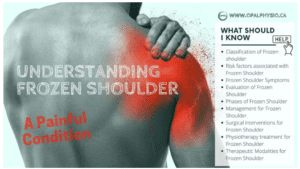Understanding the Frozen Shoulder Causes
Frozen shoulder causes – Frozen shoulder, or adhesive capsulitis, is a condition characterized by pain, stiffness, and limited mobility in the shoulder joint. The exact cause of frozen shoulder is not always clear, but several factors can contribute to the development of this condition.

Below, we explore the various causes of frozen shoulder, its possible connections with other health conditions, and how it can lead to pain in the arm and neck.
What Causes Frozen Shoulder?
Frozen shoulder occurs when the capsule around the shoulder joint becomes inflamed, thickened, and tight, restricting movement and causing pain. The inflammation leads to the formation of scar tissue, which further limits the range of motion. While the specific cause of this inflammation is not fully understood, several factors can increase the risk of developing frozen shoulder:
Prolonged Immobilization
- After an injury, surgery, or illness that requires immobilization of the shoulder (such as a fracture or surgery), the joint may become stiff due to lack of movement. This can trigger the development of frozen shoulder as the capsule becomes stiff and tight.
Injury or Surgery
- If you experience an injury or trauma to the shoulder (e.g., a rotator cuff tear or shoulder dislocation), it can lead to frozen shoulder. Surgery on the shoulder joint or nearby areas may also increase the risk, especially if it involves long-term immobility or post-surgical complications.
Inflammation and Scar Tissue Formation
- Inflammation in the shoulder joint, which leads to the formation of scar tissue, is a key factor in frozen shoulder. This can make the shoulder joint become more tight and less mobile, leading to stiffness and pain.
Age and Gender
- Frozen shoulder is more common in people aged 40 to 60 and is more frequently observed in women. The reasons behind this are still being studied, but hormonal changes may contribute to the higher incidence in women, especially around the time of menopause.
How Does Menopause Contribute to Frozen Shoulder?
One of the factors that may increase the likelihood of developing frozen shoulder is menopause. During this stage of life, women experience significant changes in hormonal levels, especially a decrease in estrogen, which plays a role in tissue health and lubrication. Some studies suggest that the hormonal changes associated with menopause may lead to:
- Joint Inflammation: Reduced estrogen levels may contribute to joint inflammation, leading to conditions like frozen shoulder.
- Increased Risk of Stiffness: Post-menopausal women are at a higher risk of joint stiffness and stiffness in the muscles, which can set the stage for frozen shoulder.
Can Frozen Shoulder Cause Arm Pain?
Yes, frozen shoulder can cause arm pain. The pain is typically felt in the shoulder area but may radiate down the arm. As the shoulder joint becomes stiffer, the surrounding muscles and tendons become tighter, which can contribute to discomfort in the arm. This referred pain may be more noticeable when attempting certain movements, such as lifting the arm or reaching.
- Pain Distribution: The pain usually begins in the shoulder joint and can extend down the upper arm, especially during movements such as reaching behind the back or lifting overhead.
Can Frozen Shoulder Cause Neck Pain?
Frozen shoulder can also lead to neck pain. As the shoulder becomes stiff and painful, it can affect the surrounding structures, including the neck and upper back. Neck pain in frozen shoulder often occurs due to the following reasons:
- Muscle Compensation: As the shoulder becomes less mobile, individuals may alter their posture or adopt compensatory movements to avoid pain. This can place additional strain on the neck muscles, leading to discomfort and pain in the neck area.
- Referral Pain: Sometimes, the pain from the shoulder joint can radiate upward into the neck, leading to referred pain.
Other Risk Factors and Causes of Frozen Shoulder
Several other conditions and factors can increase the risk of developing frozen shoulder:
- Diabetes: Individuals with diabetes are at a higher risk of developing frozen shoulder, likely due to changes in the body’s ability to repair tissue and manage inflammation.
- Thyroid Disorders: People with thyroid problems, such as hypothyroidism, are also more likely to develop frozen shoulder.
- Heart Disease: Some studies have suggested that people with heart disease may be more likely to experience frozen shoulder as a secondary condition.
What Is the Main Cause of Frozen Shoulder?
The primary cause of frozen shoulder is still not fully understood, but the condition typically occurs after shoulder immobility or as a result of shoulder injury or inflammation. The inflammation leads to the formation of scar tissue, causing the shoulder joint to become increasingly stiff and painful.
Frozen shoulder is a complex condition with multiple contributing factors, including injury, immobilization, hormonal changes (e.g., menopause), and inflammation. While the exact cause remains unclear, these risk factors can lead to the development of stiffness, pain, and limited range of motion in the shoulder joint. The pain associated with frozen shoulder can extend to the arm and neck, making the condition even more debilitating.
Recognizing the symptoms early and seeking appropriate treatment, including physical therapy, medications, or injections, can significantly improve recovery outcomes. Curapod, a non-invasive device that uses electrical stimulation, can also assist in managing the pain and stiffness associated with frozen shoulder, complementing other treatments to enhance mobility and relieve discomfort.
References (Cardiff Harvard Style)
- Mayo Clinic, 2025. Frozen Shoulder: Symptoms and Causes. Available at: https://www.mayoclinic.org/diseases-conditions/frozen-shoulder/diagnosis-treatment/drc-20370892 [Accessed 28 February 2025].
- American Academy of Orthopaedic Surgeons (AAOS), 2025. Frozen Shoulder: Symptoms, Causes, and Treatment. Available at: https://www.aaos.org/diseases–conditions/frozen-shoulder/ [Accessed 28 February 2025].
- Spine-Health, 2025. Frozen Shoulder Treatment and Exercises. Available at: https://www.spine-health.com/conditions/shoulder-pain/frozen-shoulder [Accessed 28 February 2025].
- Opal Physiotherapy, 2025. Frozen Shoulder: A Painful Condition. Available at: https://www.opalphysio.ca/frozen-shoulder-a-painful-condition/ [Accessed 28 February 2025].


